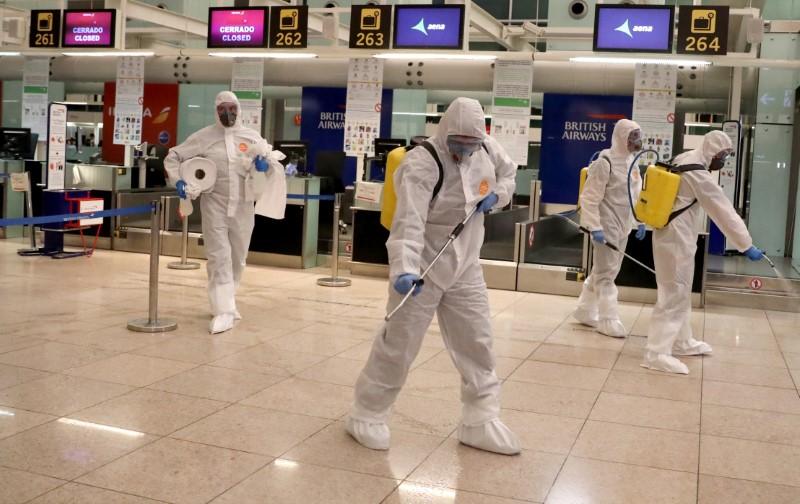MADRID -- The Spanish government on Thursday ordered the closure of all the country’s hotels and promised to implement special measures in nursing homes after a surge in the country’s coronavirus cases and deaths.
Officials reported deaths had jumped by more than a third on Thursday to 767, while the number of cases rose by a quarter to 17,149, making Spain the second worst-hit country in Europe after Italy.
The government decreed all hotels and other tourist accommodation be shut within seven days to “guarantee the containment of the pandemic,” a further hit to the country’s already ailing tourism sector.
Spain, the second most visited country in the world in 2018, has already closed its land borders to all but its nationals and residents.
Long-term boarding houses were exempted from the closure, but still subjected to a state of emergency imposed by the government almost a week ago that bars people from all but essential outings.
“The toughest moments are still to come, those moments when we will continue to see an increase in the number of cases,” Health Minister Salvador Illa said earlier on Thursday.
Several thousand troops have been deployed in dozens of cities across the country to help with decontamination efforts, triage and policing. Army units were deployed for the first time on Thursday in the independence-minded region of Catalonia, for disinfection tasks at Barcelona’s airport and port.
Authorities said 49 people had been arrested for flouting the movement bans in the past few hours.
The restrictions were giving “very good results” almost a week in, Transport Minister Jose Luis Abalos told reporters. Road traffic has fallen to one-tenth from the same period in 2019, air traffic by more than a half, while medium- and long- distance trains had only a 2% occupancy, he said, adding there were no plans to fully shut down air traffic.
Nursing homes have come under the spotlight during the crisis, with prosecutors in Madrid opening an investigation on Wednesday into more than 17 coronavirus-related deaths at a nursing home where patients had been locked down without access to hospital care.
The authorities have not specified how many people have died in nursing homes but the prosecutor general’s office said on Thursday it was also looking into the issue, as similar cases were reported at other facilities and nurses said they did not have enough protective gloves and masks.
Deputy Prime Minister Pablo Iglesias said nursing homes had to be urgently equipped with proper medical facilities and staff, calling it “an absolute priority.”
Fiscal help
Fernando Simon, the head of the health emergency centre, said Spain was “probably slowly approaching the peak of cases.”
In downtown Madrid, the Ayre Gran Hotel Colon opened its doors on Thursday after fitting its rooms with medical equipment. Hotels in Madrid have offered 60,000 beds to the health service, authorities said.
The government has promised that no one in a “difficult situation” would have home utility services cut for nonpayment.
The epidemic continued to hammer the labour market with IAG’s Iberia airlines proposing temporarily laying off up to 90% of its flying staff for three months, and carmaker Nissan saying it would indefinitely send home up to 3,000 workers.
In an interview with Antena 3 TV, Economy Minister Nadia Calvino called for an EU-wide fiscal response, after praising the latest European Central Bank’s bond purchase scheme to help blunt the impact of the disease
Prime Minister Pedro Sanchez on Wednesday predicted an economic slump this year in Spain, although he said a 200 billion euro ($220 billion) package of measures to help companies and protect workers and other vulnerable groups could bolster a swift recovery.
Spain’s main stock index Ibex 35 closed 1.55% higher after days of volatile swings, and Spanish 10-year bond yield fell from Wednesday’s 13-month highs to below 1%.




















































